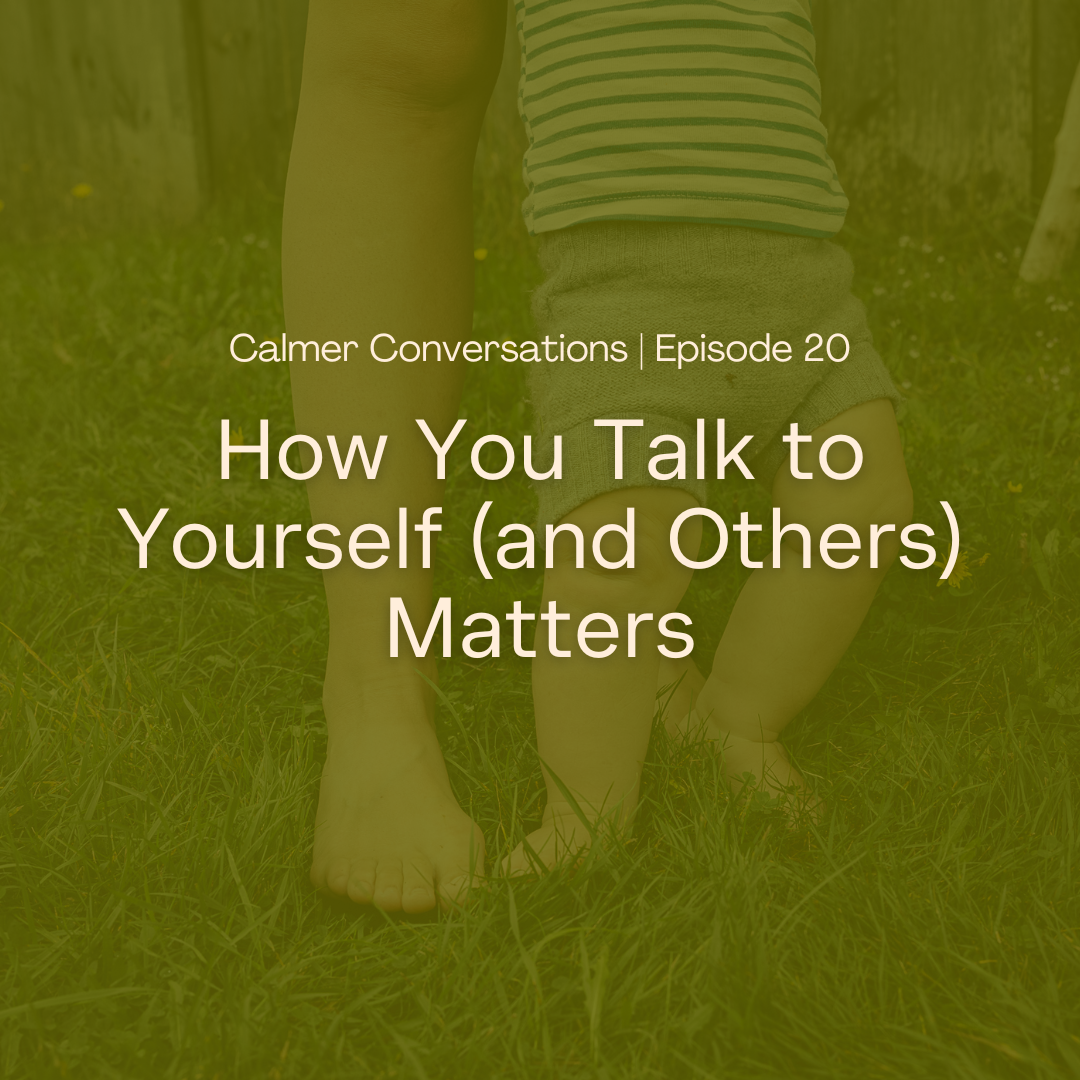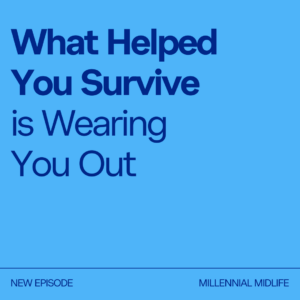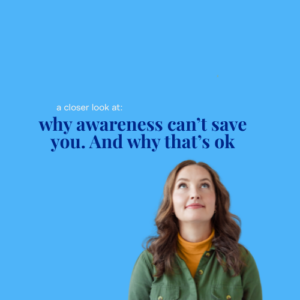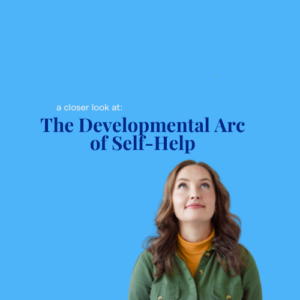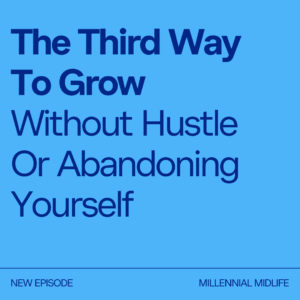Cecelia Baum Mandryk (00:01.378)
Hey, and welcome to Calmer Conversations. I’m your host, Cecilia. Today, I’m gonna talk about, last week we talked about maternity leave. Today, I’m gonna talk about how you talk to yourself, but kind of in the context of pregnancy. Again, this is something that even if you’re not pregnant, it should be applicable to you. But I’m at the end of a pregnancy. And so that’s the framing that I’m gonna take today. It’s really about how you talk to yourself.
and how we talk to each other and how much it matters. And while I’ve talked about this before, I think this is one of those foundational things that we cannot talk about enough and we cannot be presented with enough examples because it is so crucial to how we feel and how we live our lives. So that’s what we’re talking about today. If you’re human and you talk to yourself or you are a human and you are around other people, then this will be applicable to you.
and this is gonna be one of those shorter episodes. So if you wanna stick around, let’s get going. Okay, so like I said, well, if you listen to the last episode, and I’m recording this on the same day, I’m just over 40 weeks, I’m 40 weeks, two days in my pregnancy. that means, and I will say that the last time I was pregnant, I was pregnant on a small island in Maine, and so it’s not around a lot of other people, and in general,
because of my personality or who I am, people don’t often give me, I haven’t gotten a lot of advice through my pregnancies and this is my fourth pregnancy but my third two term pregnancy. So I had a miscarriage around 13, 14 weeks in between two of my kids. Okay, so, but this time I’m in a more.
public place. I’m around people a lot more, right? My kids go to school now. So my two older kids, they’re in half day Montessori school. So I see people in public and not just from like the chest up. If you’re watching this on YouTube or you see me on Instagram, where you really only see like the upper part of me and might not even know that I’m pregnant. And some people do talk to me, right? And so yesterday, I went to a toddler birthday party, which was very fun. It was at a playground.
Cecelia Baum Mandryk (02:21.282)
And I was introduced to another woman who also has two children and who is also about 40 weeks pregnant. I she’s not quite 40, but she’s like 39 weeks or something. And I want to also say this is not a dig on this woman and it’s not a rant against her. I have no idea what her history is. She might be in a ton of pain, whatever. But the opening line she had for me was in kind of a
a grumpy voice, I will say, and that’s my projection. Are you ready for it to be over? Or ready for it to be over or something kind of in that like, I don’t remember if it was a question or a comment. And honestly, that’s not where my brain is. And it kind of took me aback. And it reminded me again, this is has nothing to do with this exact woman. But it reminded me of
what we say in our society and what we say to ourselves and to each other and how much it matters. Right? So you can approach somebody and you can say many different things. You can approach yourself each day and you can say many different things. we don’t, we often kind of laugh at like self-deprecating humor or misery loves company or complaining about the weather or whatever it is.
or complaining about politics, right? When I’m recording this in the US, it’s October 28th, and so we’re coming up to a pretty big presidential election. People have these one-liners that we say, and we don’t even really think about them, because this person probably didn’t even think about this that they said, right? It wasn’t even like, maybe not even totally conscious what came out of their head and out of their mouth, because most of the things that we say to ourselves,
and to other people we don’t think a lot about, right? They are on autopilot, they are pre-programmed things that are going on in our heads. And we say them. And I don’t mean to say that you need to be 100 % intentional with everything that you say to yourself, but I do wanna suggest that what you say to yourself matters. And what you say to other people matters. And when you say something, like are you ready for it to be over?
Cecelia Baum Mandryk (04:39.712)
that brings a certain feeling into your body. That brings a certain emotion into your body. That also then continues to create a certain nervous system state within your body because your nervous system responds to what you say. So it’s reacting to what’s happening. It also changes what you do over the course of the day. So this kind of autopilot
wrote, society says that once you reach 40 weeks pregnant, you should be miserable and unable to move and all of these things might feel true for some people, right? They might get to 40 weeks pregnant and actually feel pretty terrible in their bodies and be really ready for it to be done. But there are other people who might not actually feel that way, but end up feeling closer to that because they’re saying it to themselves over and over again. And I know that this is a little bit of like a weird mind trick, but when you tell yourself
you’re ready for something to be done, or you’re miserable, all your brain can see is what’s miserable about it, right? Your brain starts to preferentially, your reticular activating system preferentially sends you more information about how miserable this is, whether you’re pregnant or not, right? So if you’re complaining about the election or about other people around you or about the weather, your brain tells you all the ways that it’s bad and that it’s hard.
and that it should be different versus if you stop, you change what you say to yourself, if you say something different, right? If you kind of like, for instance, with pregnancy, if you can like drop back into the magic of the fact that you’re like carrying a child in your body, you can start to see things differently. And I’m not trying to, it’s not gaslighting yourself. It’s not toxic positivity, but it is asking your brain, your reticular activating system to see something different.
because your brain fundamentally will only see what it thinks it should see. And I wanna give kind of a funny example for this. My two-year-old is super into vehicles. My other two-year-old was super into vehicles, now four and a half year old. So I don’t know if it’s just like a two-year-old thing or maybe it’s just my kids, but super into like dump trucks and construction vehicles and all those kinds of things. And we drive around, right? And so if you had asked me how many dump trucks I might pass,
Cecelia Baum Mandryk (07:08.962)
on a typical day before, I might have said something like three, right? I might not have even noticed those three dump trucks, to be totally honest, because my reticular activating system was not queued up to dump trucks. So I didn’t even see the dump trucks that I was passing. Now I have a kid in the back of my car who has a mirror so he can see like, I don’t know, he appears to be able to see 365 degrees around him, 360 degrees around him. And he points out every single dump truck.
And it’s not four dump trucks that we pass in the morning. It’s like 30 dump trucks that we pass in the morning or like 50 dump trucks that we pass in the morning. It seems like a kind of a wild amount of dump trucks. And to be honest, I didn’t see them before. And I didn’t see them not because they weren’t there, but because my brain wasn’t used to seeing them. Because my brain had never been trained to see dump trucks. I never asked it to see dump trucks. So it never saw dump trucks.
So if you never ask your brain to see what’s good about a situation or what you like about a situation or what might be positive about a situation, you never see it. If you only ask your brain to see the things that are going wrong or see the things that are hard or see where you’re failing or where you’re not measuring up, that’s all you will see. It’s really truly, it’s all you will see. It’s not the truth. It is 100 % not the truth, right? It was not the truth that I wasn’t passing.
I’m not passing more dump trucks now than I was before. I’m just seeing them. So the truth is not that there are more dump trucks on the road. The truth is that I was not seeing them because my brain was not looking for them. It wasn’t a piece of information that my brain was filtering for. And so when we are not expecting to see something, we don’t actually see it. And this is huge for how you talk to yourself and how you talk to your friends.
And again, I know that the whole like misery love company and we like to complain and there’s like these societal things that it’s just like acceptable to complain about. But really think about and notice how it makes you feel. Because I’m guessing it’s not very good. And so then you might say, you know, I know that this is how generally people relate, they relate over how hard pregnancy is for me. That’s the example that I’m giving right now. But I don’t want to feel that way about my pregnancy. I don’t want to feel that way about my body.
Cecelia Baum Mandryk (09:28.32)
I don’t want to notice every little thing that might be hurting or going wrong or is different. I want to notice the magic of it. I want to be connected with this baby that’s inside of me. I want to feel powerful and strong going into birth. And those are all things that I can take my brain to. Like I can take my brain to dump trucks, but I just have to ask it different questions and ask it to notice different things. And that will never happen if I’m also, if I’m preferentially saying like, this is so miserable, it’s so hard. I wish this were over. So if you want to shift,
that one of the easiest ways to shift how you feel in life is to just notice how you talk to yourself right now and see if you can make some small changes so that you can notice other things. So start noticing the dump trucks, right? Like start noticing where you’re doing things well. This is the principle of the WINS course. And while the WINS course is almost, or probably over by the time you’re listening to this, you can grab it and you can listen to all the…
replays and you can have a PDF of the journal. I think I might even have one more physical journal left if somebody wants it. But you can change what your brain sees. You can start to see dump trucks on your drives and then you will start to notice how many amazing things are going right for you. And I promise it is life-changing and all it’s doing is asking your reticular activating system, asking the part of your brain that does this anyway.
to notice what you want it to notice instead of noticing what you don’t want it to notice, which is everything that’s going wrong. Okay, it’s such a useful thing to do. is just notice every time you’re using self-deprecating humor. Notice every time you’re connecting in a place of complaining and see if you can take a break from it for the next 30 days and see how much your life changes. All right, that’s my short little episode on what you say to yourself and other people matters. I will see you next week, bye.

